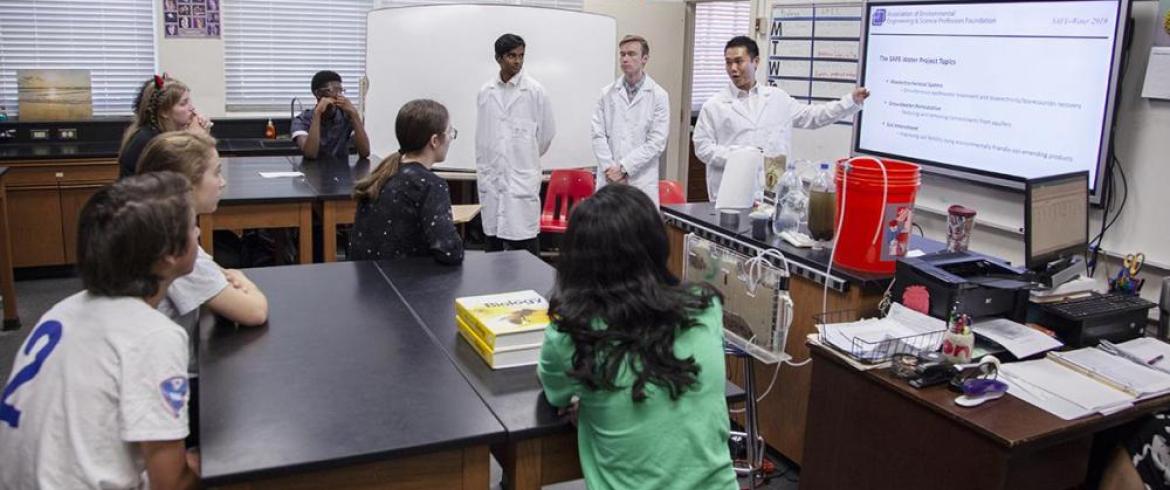
Pranav Muthuraman Geetha, Simeng Li, Ph.D. and Kyle Long of FAMU-FSU Engineering present to a class at Leon High School in Tallahassee FL (Photo: M Wallheiser/FAMU-FSU Engineering)
Clad in white lab coats, three scientists stand at the front of a high school classroom, with a show-and-tell presentation they hope will inspire the next generation of scientists who have a passion for protecting the planet.
Called the food-energy-water nexus, the United Nations considers the convergence of these three things as central to sustainable development. Demand for all three is increasing, driven by a rising global population, rapid urbanization, changing diets and economic growth. Agriculture is the largest consumer of the world’s freshwater resources, with more than one-quarter of the energy used globally expended on food production and supply.
Simeng Li, Ph.D., who recently earned his doctorate in civil engineering from FAMU-FSU College of Engineering’s Department of Civil and Environmental Engineering, leads the discussion with in front of Colleen Graham’s AP Environmental Science classes at Leon High School in Tallahassee, Florida. Undergraduates Kyle Long and Pranav Muthuraman Geetha, also from the College’s Department of Civil and Environmental Engineering, are on hand to show the budding scientists how the world’s impending population boom will quickly outpace its capacity for producing food for mankind — and safeguarding the planet for future generations.
For Graham, hosting the presentation dovetailed well with the class curriculum and may inspire her students to pursue a career in the field.
“This ties to a lot of things we are talking about in class, including wastewater and sustainability,” she explained. “They are showing our students a new way to think about things and the need for research and funding for environmental engineering.”
If anyone in the class wondered, “why should we care about sustainability?” Li and his colleagues backed up their claims with data.
This year, the human population already has exceeded 7.7 billion, and by 2050 it will grow to 9.7 billion. Current agricultural production worldwide cannot support a population that size — daily grain production alone cannot keep pace. Increasing production to needed levels will require clean water and fertilizer, which take energy to produce. And, this production creates wastewater that must be responsibly discharged — also requiring energy.
Environmental engineers both now and in the future will be tasked with finding sustainable solutions for this cycle.
Li and his team showed the students how the bioelectrochemical system, groundwater mediation and soil amendment each affect the delicate nexus in different but important ways. For maximum effect, they also brought visual aids including stormwater samples and testing kits. By asking questions and showing simple environmental engineering tests, they were able to engage and educate the students, and tie back to their daily education in Graham’s classroom.
“It's great to learn new concepts in the lab and use this knowledge to teach students who will hopefully grow up to become engineers,” Long said.
The presentations were funded in part by a SAFE-Water Project grant from the Association of Environmental Engineering and Science Professors (AEESP) Foundation. AEESP is made up of professors in academic programs throughout the world who provide education in the sciences and technologies of environmental protection.
The SAFE-Water Project introduces state-of-the-art applications in environmental engineering and science to K-12 students (with a focus on female and underresourced students) and motivate their interest in pursuing higher education in science, technology, engineering and mathematics (STEM). At the same time, STEM undergraduate students from FAMU-FSU Engineering assist the teaching and serve as role models for participants.
To learn more, visit the SAFE-Water Project website.
